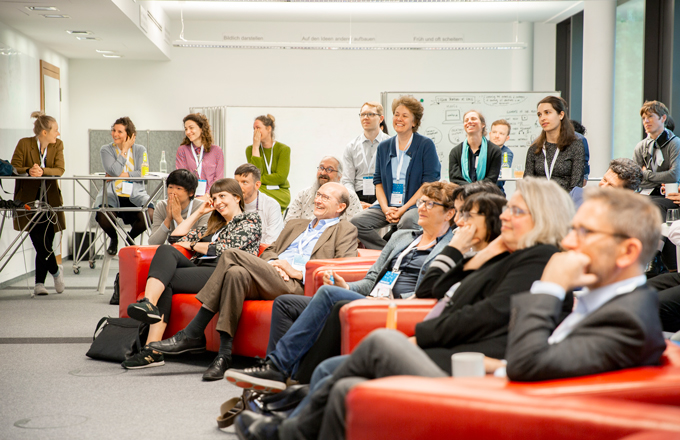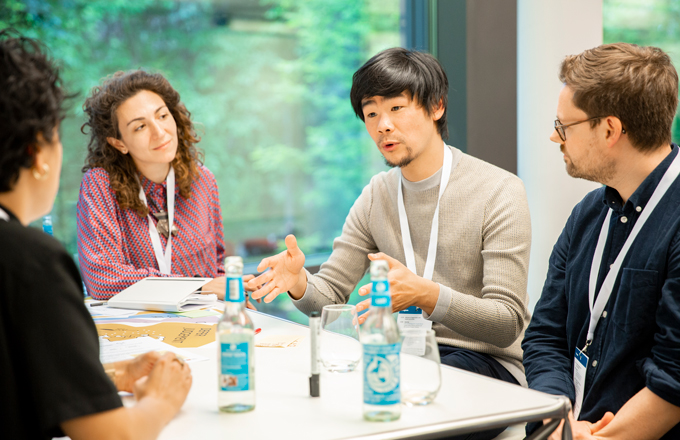The day kicked-off with presentations by HPI D-School coaches and alumni who apply Design Thinking in non-profit organizations to create social innovations.
Our coaches Isabelle Dechamps and Yi-Cong Lu introduced their initiative be able e.V. The non-profit association focuses on the development of open source hardware for healthcare that are co-created together with users, for example people with disabilities.
Alumnus Michael Metzger of D-Collective spoke about the workshop format “Redesign Democracy”. By applying methods of Design Thinking, this initiative supports people to convert their political interest into sustainable activism.
The third case study was presented by alumnus Lucas Paes de Melo who introduced his startup Amparo that developed out of a design challenge at the HPI D-School. Amparo develops cost-efficient prosthetic sockets that are especially helpful for amputees from the global south.
After these insights into projects that made Design Thinking a central approach in their organizational structure, we facilitated an HPI D-School World Café. In this session, we discussed the latest insights from the Hasso Plattner Design Thinking Research Program (HPDTRP) and exchanged new innovation methods with our participants.
In the final session of the Partner Day, representatives from partner companies shared their experiences of working with HPI D-School student teams. They talked about their successes and challenges as well as the long-term effects of the cooperation with the HPI D-School.
Heiko Witte of Rolls Royce enthusiastically explained how the student team captured the problem posed in the design challenge within a short time. Goal of the challenge was to develop an effective and collaborative shift planning system. The students took a path far from the traditional management approach at Rolls Royce. They spoke with employees in the production and were able to learn about their needs and wishes. The perspective of the employees in production was directly incorporated in the development of the prototype for the digital shift planning tool. This tool is currently being developed by Rolls Royce in cooperation with the Fraunhofer Institute in Leipzig.
For Bettina Honegger and Michael Haring of Sanofi-Aventis, the collaboration with the student team of the HPI D-School caused a lasting change in their approach to address projects. Especially the focus on human-centeredness, which is central in Design Thinking, led to a new orientation in their team. The Sanofi marketing team now actively looks at their customers’ needs and wishes. The mindset and way of working of the students inspired Sanofi-Aventis to develop some new projects. After a co-creation workshop with doctors and a hackathon, the Sanofi-Aventis team created a website with a chatbot for doctors and plans to continue using Design Thinking for their next projects.
HPI D-School alumna and coach Elisabeth von Helldorf shared insights into her work at Zalando. She impressively described how her team reorganized the interior design of the offices at Zalando Berlin in order to be able to react to Zalando’s rapid growth more efficiently.
Our alumna Lisa Henke, who is a user researcher at Viessmann, highlighted in her presentation how a traditional family-owned enterprise like Viessmann approaches digital transformation. At Viessmann Design Thinking is defined as an integral part of the company culture. It is integrated into the company through a stronger focus on human-centered research.
We would like to thank our speakers for their contributions, our guests for the discussion, and look forward to our next Partner Day on 10 June 2020.
Photos: Anja Harnisch / HPI D-School


